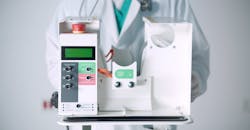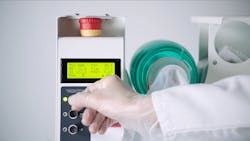The answer? Innovators come together. This was the situation that occurred in New York as it become dangerously clear that the lack of an $8 sensor was a one of many reasons why area hospitals were struggling to source the ventilators they needed to assist patients struggling with COVID-19.
This is a story of just sheer ingenuity of engineers, clinicians and inventors, and the failure of the world's supply chain. And the agility of New Yorkers to respond to this, explains Scott Cohen, founder of Newlab. "It's about an $8 sensor that was really bottled up in the supply chain, and it's about a city of 8 million people under siege by this virus in a short period of time, and a group of engineers racing against the clock, while critical care specialists, visit our factory in disbelief that we could forge this glimmer of light for them,” says Cohen. “It was incredibly moving, when they came there and they saw what we were doing and they told us how important it was the device we were building, how helpful it could be to saving lives and hospital system."
The effort is the result of weeks of collaboration between engineers based at Newlab, led by 10xBeta, and MIT researchers to iterate MIT's initial design. Working closely with clinicians and hospitals in NYC, the new design, called the Spiro Wave is currently under production by Boyce Technologies and will soon scale to 500 units per day. Newlab is talking to FDA compliant factories in other jurisdictions to qualify them to grow production as well.
The Spiro Wave works by compressing a manual resuscitator just like a care provider would by hand. It is compatible with standard Ambu and other BVM bags — flexible, plastic pouches used in every hospital in the country to pump air into a patient’s lungs in emergency situations.
The Spiro Wave includes the necessary software, sensors and safety systems to enable clinicians to effectively monitor and adjust key respiratory and ventilation parameters like tidal volume, respiratory rate (BPMs), I/E ratio. In just a few weeks, the group behind the project has obtained Emergency Use Authorization from the FDA, allowing hospitals in need to use the Spiro Wave in response to the crisis.
While it does not replace a full feature ventilator that the sickest patients will need, the Spiro Wave provides the basic core features of a conventional ventilator allowing it to provide a bridge and surge support for patients in need of more invasive mechanical ventilation therapy but do not yet need a full ICU ventilator. This approach frees ICU ventilators for the most severe cases. The first 3000 devices will be sent to NYC hospitals to help them get through the current surge in cases. From there, Boyce and manufacturers around the world will be able to use the Spiro Wave design to meet the global ventilator shortfall.
Beyond the current pandemic-based needs, the team has been very steadfast in building a device that it feels has sustained utility, prompting it to purse permanent FDA certification. “There are many parts of the world that I feel have a very severe shortage of ventilators and it's primarily because the costs have been so high,” says Cohen.
About the Author
Peter Fretty
Technology Editor
As a highly experienced journalist, Peter Fretty regularly covers advances in manufacturing, information technology, and software. He has written thousands of feature articles, cover stories, and white papers for an assortment of trade journals, business publications, and consumer magazines.

